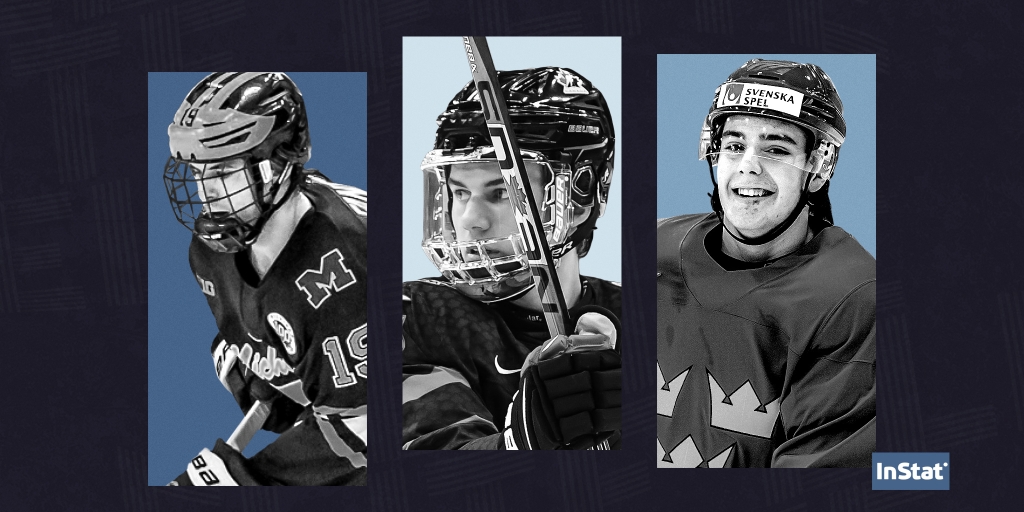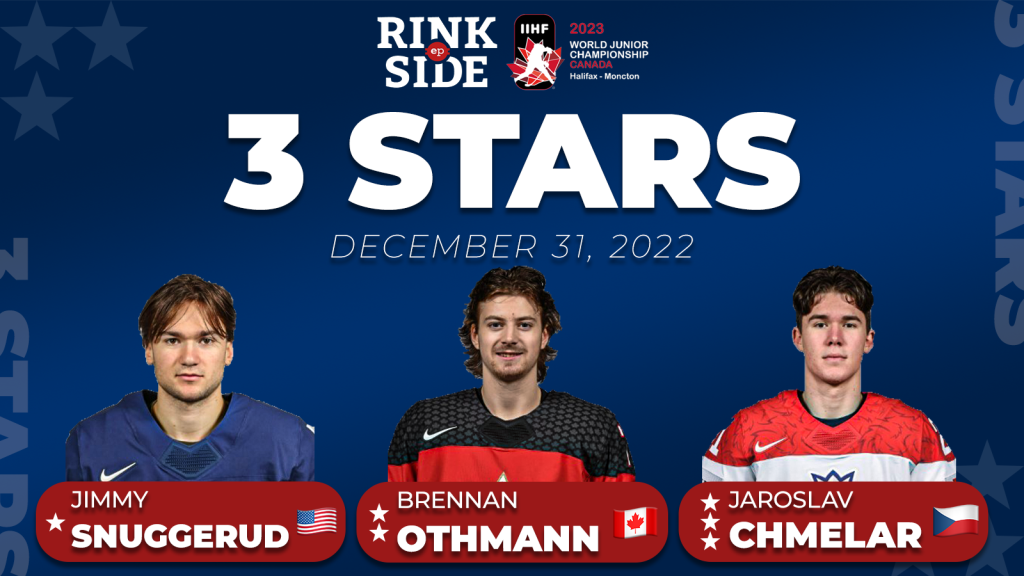The top 10 single-game performances from World Juniors group stage
Through the preliminary round, the 2023 World Juniors have been one of the most memorable tournaments in recent history.
Part of that has been upsets. Switzerland took down Finland in the first game. Latvia gave multiple teams a scare, including Team USA. And how about Czechia not just taking Canada down, but outplaying them?
This has also been a tournament of unbelievable performances. Connor Bedard has 18 points in four games; he's out here tying records every other shift. Let's look at those incredible single-game performances from the first leg of the tournament.
The performances are ranked by Game Score, a volume-based metric that weighs to different micro stats, including shots, shot assists, entries, exits, break ups, retrievals, and more. The version used for this article excludes goals and assists. The data used in this article has been tracked by Mitch Brown and Lassi Alanen and only accounts for 5-on-5 play.
10. David Reinbacher, D, Austria (2023 Draft Eligible), Dec 30th vs. Germany
Key stats:
- 2 scoring chances, 2 scoring chance assists
- 6 shots, 3 shot assists
- 9 controlled exits, 5 controlled entries, 88% success rate in transition
- 4 DZ retrievals, 4 DZ break ups
- 11 advantages created
- Game Score: 2.54
Despite Austria being the weakest team in the tournament by a wide margin and likely destined for relegation, David Reinbacher has been able to hold his own and continue to bolster his draft stock after a productive first half of the season in the top Swiss league.
Through three games of stiff competition, Reinbacher posted impressive defensive and transition results, but couldn't get much of anything offensive against. In Austria's last game versus Germany, Reinbacher took over the game.
Logging huge minutes on the top pairing, he shined in all three zones, moving the puck with high volume while maintaining excellent efficiency. While the next-best Austrian defenceman recorded four controlled exits, Reinbacher managed nine. He also led the game in various other metrics, including shot contributions and advantages created. We're very interested to see how he's able to continue from here in the relegation series versus Latvia.
9. David Jiříček, D, Czechia (Columbus Blue Jackets), Dec 31th vs. Germany
Key stats:
- 9 shots, 7 shot assists
- 2 scoring chances, 1 scoring chance assist
- 90% success rate in transition
- 7 entries prevented out of 8 entries total
- 7 advantages created
- Game Score: 2.54
After producing at a high clip in the AHL and already having a few games of NHL experience under his belt, it wasn't exactly a surprise that David Jiříček was one of the best defencemen during the group stage. The most impressive performance - at least numbers-wise - came against Germany in the final game.
Funnily enough, this was also the only game where Jiříček was held pointless. Not because he didn't try, though, as he recorded a total of nine shots and seven shot assists at 5-on-5 alone. And by the way, this wasn't even his most trigger-happy game, with his 13 shot attempts against Sweden standing as the tournament high. He was also virtually unbeatable when defending against the rush while also performing at a high level with the puck in transition himself. Jiříček's play during the group stage was a big reason for Czechia's success, and he'll be a strong contender for the All-Star lineup if they can get past Switzerland in the quarterfinals.
8. Šimon Nemec, D, Slovakia (New Jersey Devils), Dec 30th vs. Latvia
Key stats:
- 11 shots, 0.31 xG
- 9 controlled exits, 5 cross-lane passes in DZ
- 7 entries prevented out of 10 entries total
- 4 DZ break ups
- 8 advantages created
- Game Score: 2.56
Much like his draft rival Jiříček, Šimon Nemec came into this tournament with high expectations. Though the former had a stronger group stage overall, it was Nemec who turned out the better single-game performance (although by the slimmest of margins) when he led Slovakia to an important win over Latvia in a close contest.
Scoring an important third-period goal off a joined rush, Nemec led the entire game with 11 shot attempts. He displayed a lot of craftiness on breakouts, logging nine controlled exits in the process. While his overall transition success rate was on the lower side compared to the performances mentioned earlier on this list, he's showing off a much stronger defensive game. He's breaking up plays earlier and with more aggression, highlighted in both this game and especially in Slovakia's game against Team USA. He'll need to replicate this type of performance if Slovakia wishes to upset Canada in the quarters.
7. Sean Behrens, D, USA (Colorado Avalanche), Dec 26th vs. Latvia
Key stats:
- 1 scoring chance, 2 scoring chance assists, 0.66 xP1
- 5 slot passes, 60% slot pass completion rate
- 6 controlled exits, 6 controlled entries, 79% success rate in transition
- 10 entries prevented out of 11 entries total
- 10 advantages created
- Game Score: 2.67
Arguably the best-performing defenceman in the tournament so far, Sean Behrens started out with a bang against Latvia, recording the second-highest single-game Game Score among defencemen through the group stage.
Adding a goal and a primary assist at 5-on-5, Behrens was a force in the offensive zone, setting up two scoring chances and recording five completed passes to the slot. What stood out the most from the stat line, though, was his 10 prevented entries, which was the most any player logged in a single game during the group stage. He's been a stabilizing presence for Team USA in all three zones, combining his crafty activation, rush defence, and breakouts to elevate the games of those around him. The electrifying Luke Hughes has found another level playing alongside the stabilizing Behrens in the last two games of the tournament – the two could very well end up as the tournament's best pairing.
6. Jiří Kulich, F, Czechia (Buffalo Sabres), Dec 31th vs. Germany
Key stats:
- 8 scoring chances, 1.16 xG
- 12 shot attempts, 3 shot assists
- 2 controlled exits, 3 controlled entries, 42% success rate in transition
- 3 OZ retrievals
- 3 advantages created
- Game Score: 2.71
Jiří Kulich scored a hat-trick in the second game versus Latvia and was held pointless in the other three. Funnily enough, it was actually his final game versus Germany that earned him a spot on this list.
Based on his talent, one could think Kulich should have scored in this one based on all the chances he was generating in the offensive zone. He led the game with eight scoring chances and over a goal worth of expected goals. The former was the second-best mark of the entire group stage. And he's also showing off his improving playmaking ability, working pucks laterally in transition and slipping pucks back inside the slot instead of pulling the trigger. Interestingly, it wasn't a particularly noteworthy showing from Kulich in other ways. He was only successful with 42 percent of his transition attempts and created just three advantages. That's how it goes sometimes.
5. Brandt Clarke, D, Canada (Los Angeles Kings), Dec 29th vs. Austria
Key stats:
- 3 scoring chances, 4 scoring chance assists
- 0.25 xG, 0.78 xA1
- 6 shots, 7 shot assists, 5 slot passes
- Game Score: 2.74
The most hyped-up defencemen in the tournament delivered during the group stage, and none did it better in a single-game context than Brandt Clarke against Austria. Though he added just one primary assist in the 11-0 win, he could've easily had more based on all the chances he was generating.
This was a vintage Clarke offensive performance, as have most of his games so far. He doesn't just activate and make the odd play; he controls the flow of the game through the back-end, jumping ahead of his forwards in the rush, proactively activating off the point to create passing options, and setting up chances from the half-wall like he's a forward on the powerplay. By the numbers, his 0.78 expected primary assists was the best single-game mark of the group stage among all defencemen -- and by a decent margin. In total, he set up four scoring chances and completed 80 percent of his passes to the slot, the type of results generally reserved for forwards.
4. Connor Bedard, F, Canada (2023 Draft Eligible), Dec 26th vs. Czechia
Key stats:
- 6 scoring chances, 3 scoring chance assists
- 7 shots, 4 shot assists
- 5 controlled exits, 8 controlled entries, 72% success rate in transition
- 4 cutbacks/delays in transition
- 11 advantages created
- Game Score: 2.76
The fact that Connor Bedard has multiple games in the top-10 shouldn't come as a surprise to anyone. The first of them was the tournament opener against Czechia, making it even more impressive, considering none of the other entries on this list are from games against the top teams.
Even in a loss and when “held” to one point, Bedard was clearly the best player on the ice. He had six scoring chances and set up three, most in highlight-reel fashion. This game also showed off his improvements, particularly his improved change-of-pace and delay game in transition, which has made him one of the best playmakers in the prospect world. And he almost scored the goal of the tournament.
3. Logan Stankoven, F, Canada (Dallas Stars), Dec 29th vs. Austria
Key stats:
- 6 scoring chances, 1.28 xG
- 2 scoring chance assists, 0.61 xA1
- 9 shots, 5 shot assists
- 2 controlled exits, 5 controlled exits, 71% success rate in transition
- 7 advantages created
- Game Score: 3.20
Though Bedard got and will continue to get all the headlines, and deservedly so, Logan Stankoven was arguably the second-best player of the entire group stage, and the two immediately formed a deadly combination when put on the same line.
Against heavily out-matched Austria, Stankoven added a goal and three primary helpers, but also had six scoring chances and set up two more for his linemates. His 1.28 expected goals and 1.88 expected primary points were both the second-best marks of the group stage. Outside of the pure offensive domination, he helped his line in transition and chipped in defensively, too. One thing to watch going forward: his work on the forecheck. He's been a menace, creating piles of turnovers and poor decisions from opponents with non-stop pressure. His dog-on-bone mentality has been the perfect complement to Bedard's anticipation – a great reminder that forechecking isn't just about size and physicality.
2. Jimmy Snuggerud, F, Team USA (St. Louis Blues), Dec 26th vs. Latvia
Key stats:
- 11 scoring chances, 1.61 xG
- 1 scoring chance assist, 0.09 xA1
- 15 shots, 2 shot assists
- 4 controlled exits, 7 controlled entries, 64% success rate in transition
- 7 advantages created
- Game Score: 3.38
If Stankoven is a contender for the title of the second-best forward of the tournament after the group stage, Jimmy Snuggerud is definitely in that mix, too. Following up his stellar play with the University of Minnesota, he leads Team USA in goals and points, including a four-point showing in the final group stage against Finland.
It was actually his opening game versus Latvia that puts Snuggerud on this list, though. He only scored once, but managed 11 scoring chances and 1.61 expected goals with 15 shot attempts. All three marks are tournament-leading, and I'll be very surprised if any of them are topped during the medal round. Aside from getting a scoring chance almost every shift, he entered the zone seven times with control, just more proof that he's turned into a legitimate play-driver this season.
1. Connor Bedard, F, Canada (2023 Draft Eligible), Dec 29th vs. Austria
Key stats:
- 6 scoring chances, 1.22 xG
- 5 scoring chance assists, 0.85 xA1
- 10 slot passes
- 6 OZ retrievals
- 8 advantages created
- Game Score: 3.75
Shouldn't come as a surprise that the top spot on this line goes to Bedard and his six-point outing against Austria. He finished top-two in game score in three of the four days he played. The one he didn't? He finished 10th for the day, but still led both Canada and Sweden. He generated over a point worth of expected primary points in every single game. Talk about consistency.
Against Austria, Bedard managed six scoring chances and five scoring chance assists for a total of 2.07 expected primary points, the clear top mark in the tournament so far. He also completed a staggering 10 slot passes (another tournament-best) with 75 percent success rate, had six retrievals in the offensive zone and one in the defensive end, prevented two entries and created eight advantages.
This was a performance for the ages and will almost certainly not be topped in this tournament. With 18 points in four games, Bedard will almost certainly surpass the 20-point mark during the medal round, becoming the first player to do so this century. Accounting for different eras and context, Bedard could be on his way to the most dominant World Juniors showing of all time. Enjoy the ride.


(1).png)

